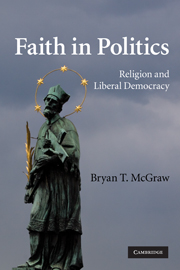Book contents
- Frontmatter
- Contents
- Acknowledgements
- Introduction
- 1 Europe's religious parties and the liberal consensus
- 2 The argument for deliberative restraint
- 3 The problem with secular reasons
- 4 Public reason and religious conflict
- 5 Religion and the problem of political autonomy
- 6 Making the most of conflict: religion and political toleration
- Conclusion: toward a better sort of liberal democracy
- Bibliography
- Index
Conclusion: toward a better sort of liberal democracy
Published online by Cambridge University Press: 05 June 2012
- Frontmatter
- Contents
- Acknowledgements
- Introduction
- 1 Europe's religious parties and the liberal consensus
- 2 The argument for deliberative restraint
- 3 The problem with secular reasons
- 4 Public reason and religious conflict
- 5 Religion and the problem of political autonomy
- 6 Making the most of conflict: religion and political toleration
- Conclusion: toward a better sort of liberal democracy
- Bibliography
- Index
Summary
Few issues seem to vex liberal political theorists as much as those concerning religion's place in contemporary democratic political life. In one sense, the continuing controversies are surprising. It is as settled as anything can be, after all, that political authorities may not coerce citizens into professions of faith and that church and state, even if they need not be separated as strongly as they are in the United States, must be distinct enough to give one another “freedom of movement.” Religious liberty is a “first liberty” without which no state can reasonably be called liberal or democratic. Its benefits, both political and religious, are so obvious and attractive that religious traditions long thought inimical to its charms have become significant, perhaps leading, proponents of its protection and expansion.
In another sense, however, the controversies should not surprise us. Though Locke was right to suggest that declining to make the state responsible for securing our religious salvation would lower the temperature of political conflicts, he was wrong to think that the conflicts would be rare. Religions have always had something to say about the way we ought to dress, what foods we should (or should not) eat, how we should raise our children and care for our elderly, how we should make and spend our money, and how we should identify and treat our neighbor.
- Type
- Chapter
- Information
- Faith in PoliticsReligion and Liberal Democracy, pp. 260 - 292Publisher: Cambridge University PressPrint publication year: 2010

